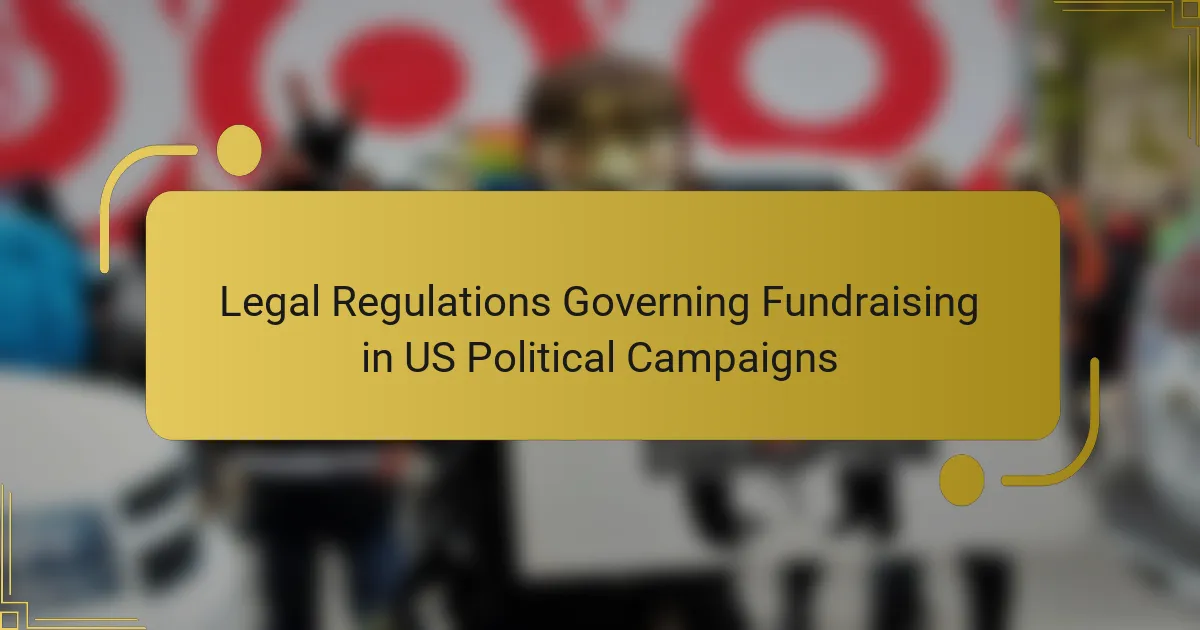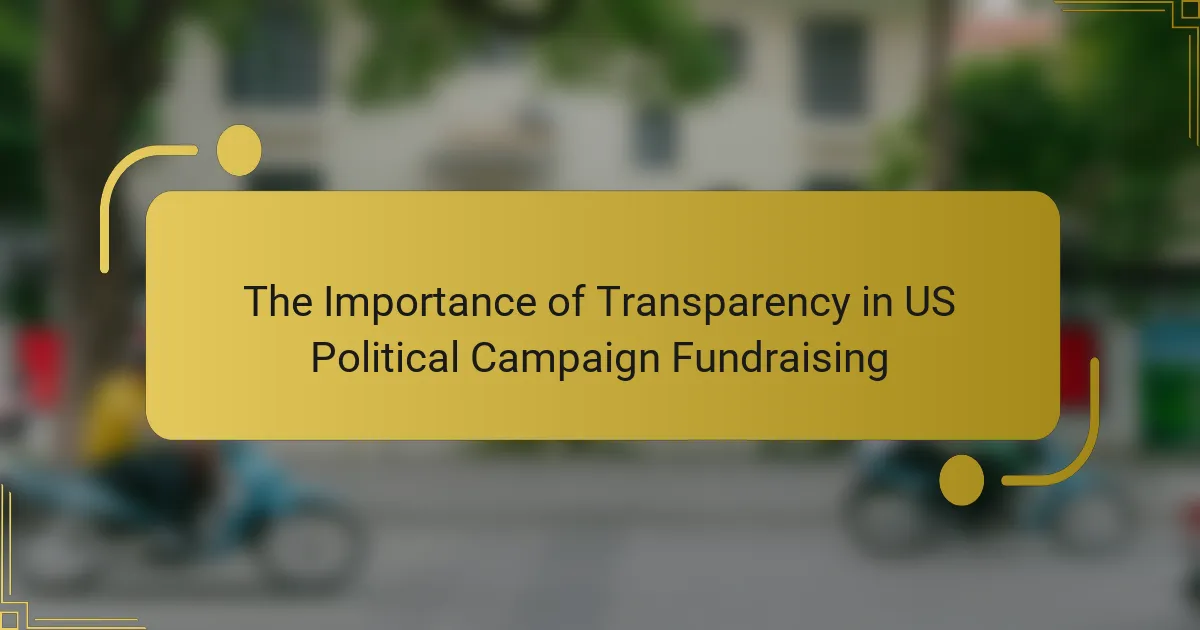The legal regulations governing fundraising in US political campaigns are primarily established by the Federal Election Commission (FEC). These regulations include contribution limits for individuals and political action committees (PACs), disclosure requirements for campaign financing, and prohibitions against certain funding sources, such as direct contributions from corporations and labor unions. Recent updates for the 2023-2024 election cycle have increased individual contribution limits and introduced new transparency requirements for digital advertising. The Bipartisan Campaign Reform Act (BCRA) of 2002 further emphasizes the importance of preventing corruption and ensuring accountability in political fundraising practices. Overall, these regulations are designed to maintain the integrity of the electoral process and promote fair fundraising practices.
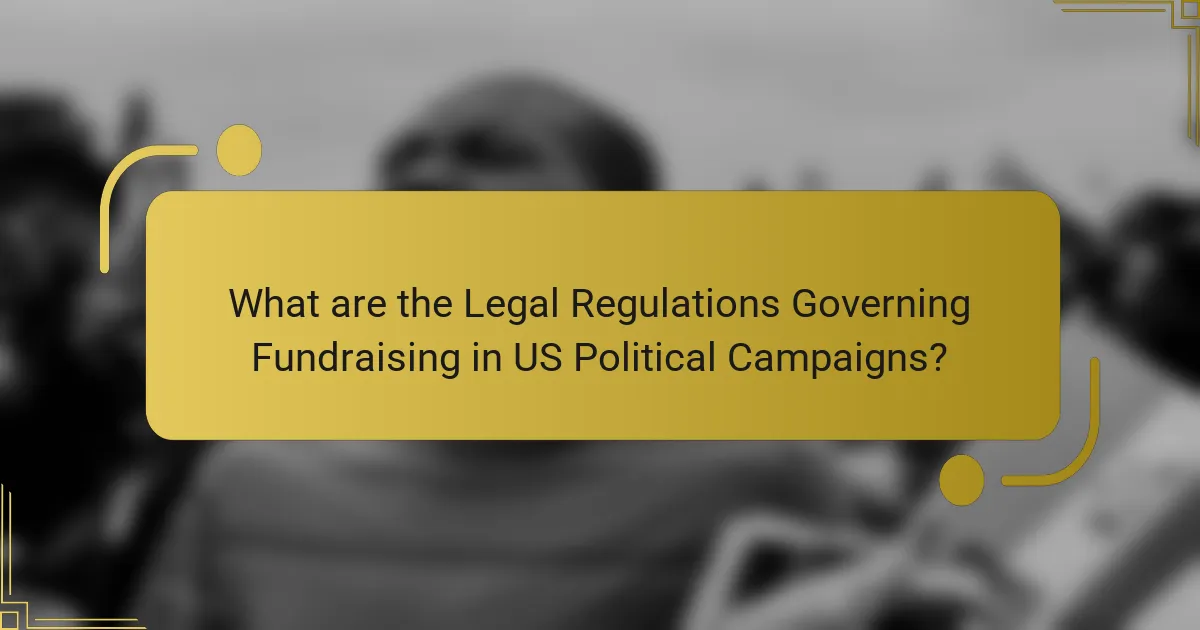
What are the Legal Regulations Governing Fundraising in US Political Campaigns?
The legal regulations governing fundraising in US political campaigns are primarily established by the Federal Election Commission (FEC). These regulations include limits on contributions from individuals and organizations. For instance, individuals can contribute up to $2,900 per election to a candidate. Political action committees (PACs) have different limits, typically capped at $5,000 per candidate per election.
Additionally, corporations and labor unions are prohibited from making direct contributions to candidates. They may, however, establish PACs to raise and distribute funds. Campaigns are required to disclose their contributions and expenditures, ensuring transparency.
Violations of these regulations can result in fines and legal action. The Bipartisan Campaign Reform Act (BCRA) of 2002 further tightened regulations, especially regarding soft money contributions. These laws aim to prevent corruption and ensure fair practices in political fundraising.
How do these regulations impact political candidates?
Regulations governing fundraising in US political campaigns significantly impact political candidates. These regulations dictate how much money candidates can raise and from whom. They set limits on individual contributions, which can restrict a candidate’s fundraising potential. Candidates must also disclose their donors, ensuring transparency in campaign financing. This transparency can influence voter perceptions and trust in candidates. Moreover, failure to comply with these regulations can lead to penalties, including fines or disqualification from the election. Overall, these regulations shape the financial landscape of political campaigns, affecting candidates’ strategies and resources.
What are the primary laws that govern fundraising in political campaigns?
The primary laws that govern fundraising in political campaigns in the United States include the Federal Election Campaign Act (FECA) and the Bipartisan Campaign Reform Act (BCRA). FECA, enacted in 1971, regulates campaign contributions and expenditures. It establishes limits on individual contributions to candidates and requires disclosure of campaign finance information. BCRA, passed in 2002, further restricts the use of soft money in federal elections. It also regulates the timing of campaign advertisements and imposes stricter rules on political party financing. These laws aim to promote transparency and reduce corruption in the electoral process.
How do these laws differ between federal and state levels?
Federal laws governing fundraising in US political campaigns are established by the Federal Election Commission (FEC). These laws set nationwide limits on contributions and require detailed reporting of campaign finances. State laws, however, vary significantly and can impose stricter limits or additional requirements. Some states allow contributions that exceed federal limits. Additionally, states may have different reporting deadlines and methods. For example, California has its own campaign finance laws that supplement federal regulations. This creates a complex landscape where candidates must navigate both federal and state requirements simultaneously.
Why are legal regulations important for fundraising?
Legal regulations are important for fundraising because they ensure transparency and accountability. These regulations help prevent fraud and misuse of funds. They also protect donors by requiring disclosure of where funds are coming from. For example, the Federal Election Commission mandates reporting of contributions over a certain amount. This transparency builds public trust in the fundraising process. Additionally, regulations help level the playing field among candidates. They prevent disproportionate influence from wealthy donors. Overall, legal regulations are essential for maintaining the integrity of fundraising efforts in political campaigns.
What risks do candidates face without adherence to these regulations?
Candidates face significant risks without adherence to fundraising regulations. These risks include legal penalties, such as fines and sanctions imposed by the Federal Election Commission (FEC). Noncompliance can lead to criminal charges, including fraud or conspiracy. Candidates may also face reputational damage, resulting in loss of voter trust. This can severely impact election outcomes and campaign viability. Additionally, failure to comply can result in the inability to raise funds legally in the future. Candidates could also be subject to audits, increasing scrutiny on their financial practices. Overall, non-adherence to these regulations jeopardizes both legal standing and electoral success.
How do regulations protect the integrity of the electoral process?
Regulations protect the integrity of the electoral process by establishing clear rules for campaign financing. They limit the amount of money individuals and organizations can contribute to candidates. This prevents undue influence from wealthy donors. Regulations also require transparency in reporting contributions and expenditures. Candidates must disclose their funding sources, allowing voters to see potential conflicts of interest. Additionally, regulations enforce penalties for violations, deterring misconduct. For example, the Federal Election Commission oversees compliance with these laws. Studies show that transparency in campaign financing enhances voter trust in the electoral process.
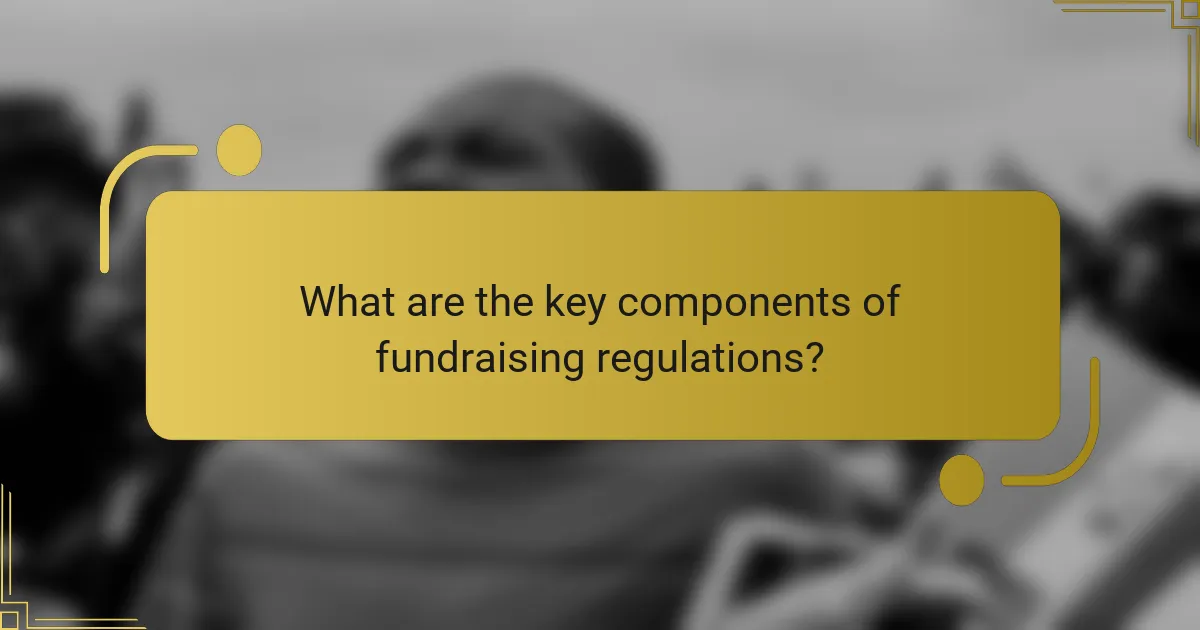
What are the key components of fundraising regulations?
Key components of fundraising regulations include disclosure requirements, contribution limits, and prohibitions on certain sources of funding. Disclosure requirements mandate that campaigns report contributions and expenditures to ensure transparency. Contribution limits restrict the amount individuals and organizations can donate, preventing undue influence. Prohibitions exist against accepting funds from foreign entities and certain organizations, maintaining the integrity of the electoral process. These regulations aim to promote fairness and accountability in political fundraising.
What types of contributions are regulated?
Regulated contributions in US political campaigns include individual contributions, corporate contributions, and PAC contributions. Individual contributions are limited by federal law to a specific amount per election cycle. Corporate contributions are generally prohibited, except through Political Action Committees (PACs). PAC contributions are regulated and must adhere to contribution limits and disclosure requirements. These regulations ensure transparency and limit the influence of money in politics. The Federal Election Commission (FEC) oversees these regulations, ensuring compliance and enforcement.
What is the difference between individual and corporate contributions?
Individual contributions are donations made by private citizens to political campaigns. These contributions are typically subject to limits set by the Federal Election Commission (FEC). For the 2023-2024 election cycle, individuals can contribute up to $3,300 per candidate per election.
Corporate contributions, on the other hand, are donations made by businesses or corporations to political campaigns. Under the Bipartisan Campaign Reform Act (BCRA), direct corporate contributions to candidates are prohibited. However, corporations can engage in independent expenditures and contribute to political action committees (PACs).
The key difference lies in the legal status and limitations of the contributions. Individual contributions are regulated and capped, while corporate contributions are restricted from direct donations but can still influence campaigns through PACs and independent spending.
How do in-kind contributions fit into fundraising regulations?
In-kind contributions are non-monetary donations given to political campaigns. These contributions can include goods or services instead of cash. Fundraising regulations require that in-kind contributions be reported similarly to cash donations. The Federal Election Commission (FEC) mandates that the fair market value of in-kind contributions be disclosed. This ensures transparency and compliance with campaign finance laws. Violations can result in penalties or fines. Thus, in-kind contributions are subject to the same limits and reporting requirements as monetary contributions.
How are fundraising limits established and enforced?
Fundraising limits are established by federal and state laws that regulate contributions to political campaigns. The Federal Election Commission (FEC) sets limits on individual contributions to candidates, parties, and political action committees (PACs). For example, as of 2021, an individual may contribute up to $2,800 per candidate per election. Enforcement of these limits is conducted through regular audits and reporting requirements mandated by the FEC. Candidates and committees must disclose their contributions and expenditures, allowing for transparency. Violations can result in fines or legal action. Historical context shows that these regulations aim to prevent corruption and ensure fair competition in elections.
What are the contribution limits for individuals and organizations?
Individuals can contribute up to $2,900 per election to a candidate for federal office. This limit applies for both primary and general elections. Organizations, including political action committees (PACs), can contribute up to $5,000 per year to a candidate. The Federal Election Commission (FEC) sets these limits. These amounts are adjusted for inflation every election cycle. Contributions exceeding these limits can result in penalties. The FEC monitors compliance with these regulations.
How do enforcement mechanisms work for violations of these limits?
Enforcement mechanisms for violations of fundraising limits in US political campaigns include audits, investigations, and penalties. The Federal Election Commission (FEC) oversees compliance with these regulations. When violations occur, the FEC may initiate an audit based on complaints or irregularities. Investigations can lead to findings of excessive contributions or failure to report. If violations are confirmed, the FEC can impose fines or other penalties. Historical data shows that the FEC has levied fines totaling millions of dollars for various violations. Additionally, state election boards may also enforce local fundraising laws. This multi-layered approach ensures adherence to fundraising limits and accountability for candidates.
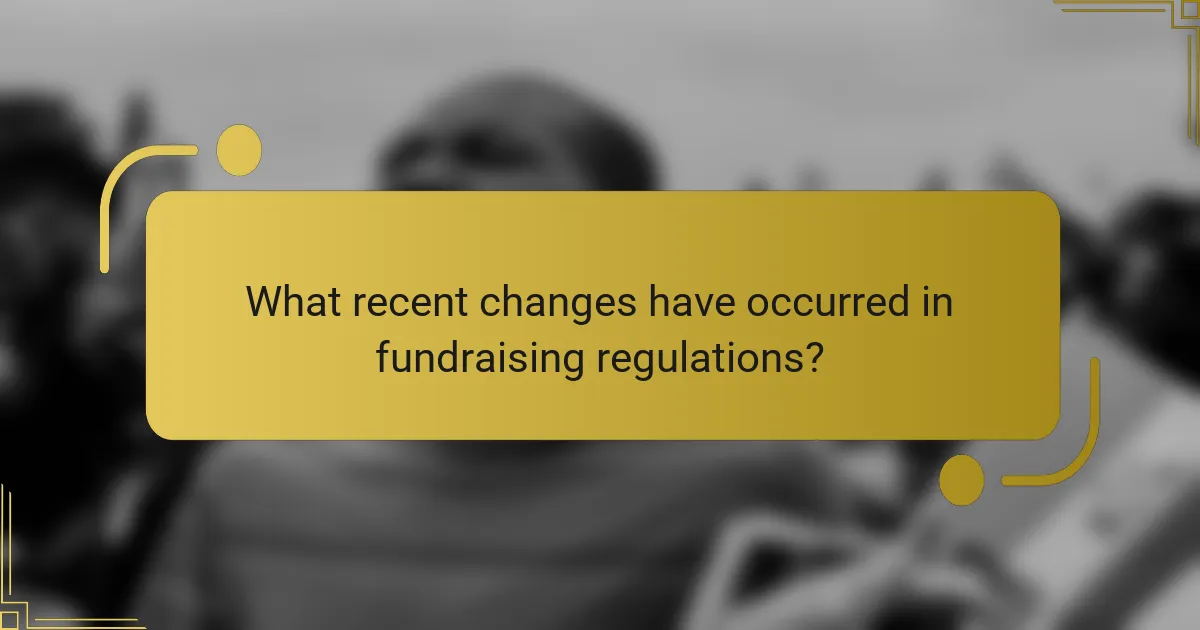
What recent changes have occurred in fundraising regulations?
Recent changes in fundraising regulations include new limits on individual contributions. The Federal Election Commission updated contribution limits for the 2023-2024 election cycle. Individual contributions to candidates increased to $3,300 per election. This change reflects inflation adjustments from previous cycles. Additionally, new transparency requirements were imposed on digital advertising. Campaigns must now disclose funding sources for online ads. These regulations aim to enhance accountability in political financing. Overall, these changes affect how candidates and parties raise funds.
How have recent court rulings influenced fundraising laws?
Recent court rulings have significantly influenced fundraising laws in the U.S. by altering the regulatory landscape for political contributions. For instance, the Supreme Court’s decision in Citizens United v. FEC (2010) allowed corporations and unions to spend unlimited amounts on political campaigns. This ruling led to the rise of Super PACs, which can raise and spend money independently of candidates. Additionally, lower courts have addressed issues related to disclosure requirements for donors. Some rulings have struck down laws imposing strict transparency measures, arguing they infringe on free speech. The impact of these decisions has resulted in increased financial contributions from entities previously limited by law. Overall, recent court rulings have expanded the scope of political fundraising while challenging existing regulatory frameworks.
What are the implications of the Citizens United decision?
The Citizens United decision allows corporations and unions to spend unlimited funds on political campaigns. This ruling fundamentally changed the landscape of campaign financing in the United States. It led to the rise of Super PACs, which can raise and spend unlimited amounts of money independently of candidates. As a result, the influence of money in politics has increased significantly. Critics argue that this undermines democratic processes and allows wealthy entities to dominate political discourse. Proponents believe it protects free speech rights under the First Amendment. Since the decision, campaign spending has reached unprecedented levels, with billions spent in recent election cycles. The implications continue to shape political strategy and voter engagement.
How have states responded to changes in federal regulations?
States have responded to changes in federal regulations by adjusting their own fundraising laws. Many states have enacted stricter contribution limits than those set federally. For instance, some states impose lower maximum donation amounts for individuals and entities. Additionally, states have increased transparency requirements for campaign financing. This includes mandating more frequent reporting of contributions and expenditures. Some states have also implemented public financing options for candidates. These responses reflect states’ efforts to maintain integrity in political fundraising. Overall, states adapt their regulations to address concerns not fully covered by federal laws.
What best practices should candidates follow in fundraising?
Candidates should follow transparency, compliance, and relationship-building best practices in fundraising. Transparency involves clearly disclosing campaign finances and donor information. Compliance means adhering to federal and state regulations regarding contributions and expenditures. Relationship-building focuses on engaging with potential donors through effective communication and outreach. Research shows that candidates who maintain transparency and compliance can enhance donor trust and increase fundraising success. According to the Federal Election Commission, failure to comply with fundraising regulations can result in fines and legal issues.
How can candidates ensure compliance with legal regulations?
Candidates can ensure compliance with legal regulations by thoroughly understanding and adhering to campaign finance laws. They should familiarize themselves with the Federal Election Commission (FEC) guidelines, which outline permissible contributions and spending limits. Regularly reviewing these regulations helps candidates avoid violations. Additionally, maintaining accurate financial records is crucial for transparency. Candidates should report all contributions and expenditures in a timely manner. Engaging legal counsel specializing in election law can provide further guidance. Training campaign staff on compliance practices also minimizes risks. Following these steps helps candidates operate within legal boundaries and fosters public trust.
What strategies can be implemented for effective fundraising within legal boundaries?
Effective fundraising strategies within legal boundaries include clear compliance with federal and state regulations. Organizations must register with the Federal Election Commission (FEC) and adhere to contribution limits. Transparency is crucial; disclosing donor identities and contribution amounts builds trust. Utilizing online platforms can broaden outreach while ensuring secure payment processing. Hosting fundraising events can engage supporters and generate funds, provided they are reported accurately. Leveraging social media for campaigns can enhance visibility and attract donations. Regularly updating supporters on campaign progress encourages ongoing contributions. These strategies align with legal requirements and foster a positive fundraising environment.
The main entity of the article is the legal regulations governing fundraising in US political campaigns. This article provides an overview of the Federal Election Commission’s (FEC) regulations, including contribution limits for individuals and organizations, prohibitions on direct corporate contributions, and the importance of transparency in campaign financing. It discusses key laws such as the Federal Election Campaign Act (FECA) and the Bipartisan Campaign Reform Act (BCRA), as well as the implications of recent court rulings like Citizens United v. FEC. The article also highlights best practices for candidates to ensure compliance with these regulations and the impact of fundraising laws on the electoral process.
